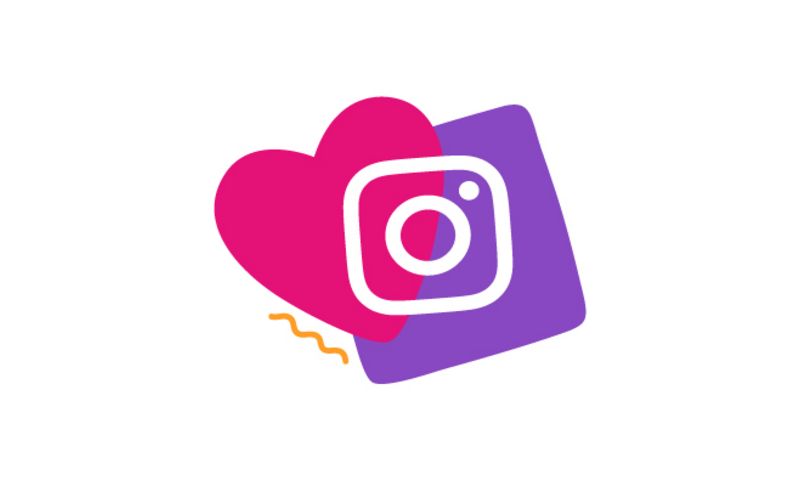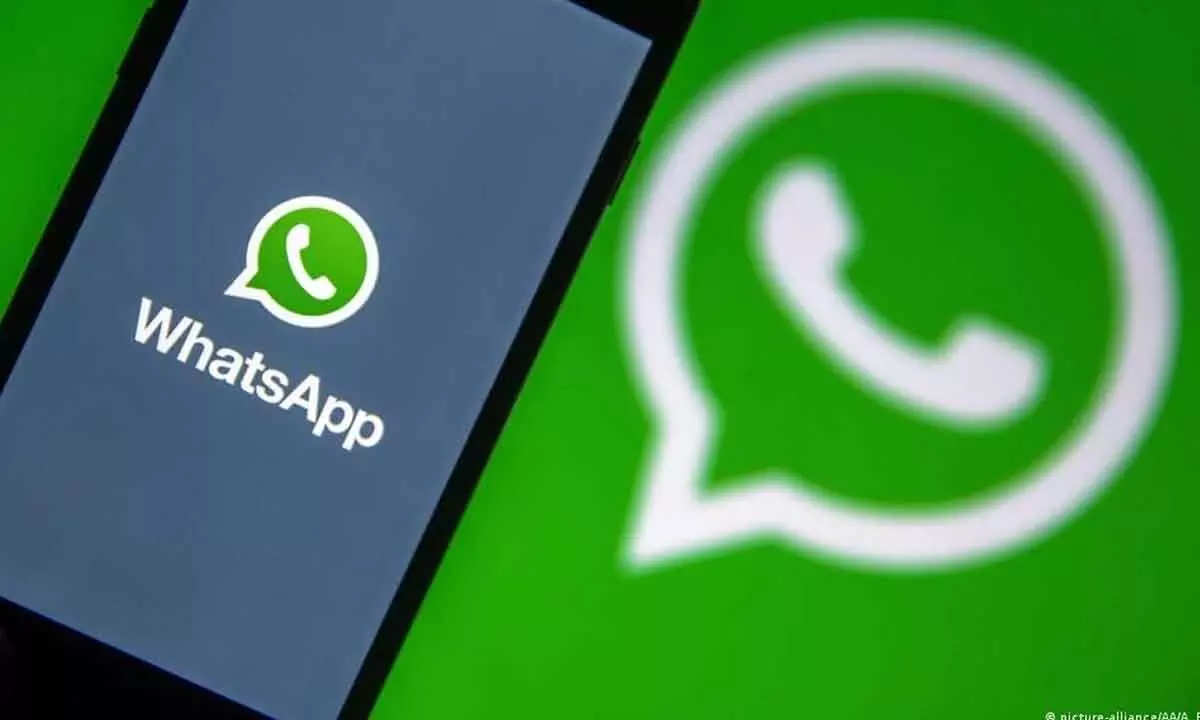Over the next few days, Facebook will stop allowing messaging in its main iPhone and Android apps, and force all their users around the world to download its standalone Messenger app. Facebook first started requiring users in Europe to use Messenger back in April, but after seeing “positive results” in terms of engagement, its rolling out the plan to the everyone. Facebook tells me people on Messenger reply about 20% faster, and not supporting multiple version of mobile chat will help it make both its main apps and Messenger better.
Mobile web, iPad, feature phone, Windows Phone, Paper, and desktop users can still message in their main Facebook apps or sites like before, and will be spared from this forced migration for now.
Previously, people could chat from a Messages tab in Facebook’s smartphone apps. They also had the option to download Messenger, which would turn the Messages tab into a notifications hub and shortcut that would fast-switch users into Messenger when tapped.
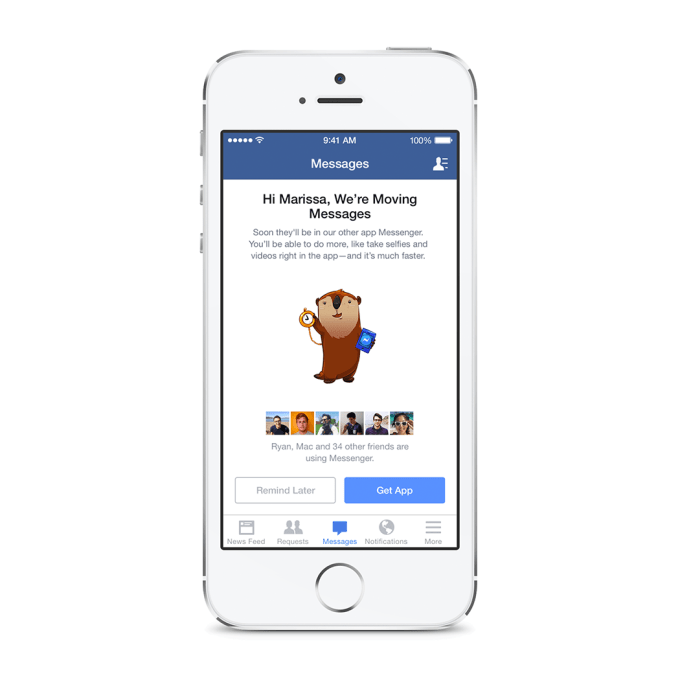
Soon, though, iPhone and Android users will be forced into this bouncing around. They’ll get a few optional notices to download Messenger before chat eventually stops working in the main apps. Facebook will also send an email to people the change will impact that explains why it’s happening.
That little clock-wielding otter in the notification about the switch is cute, but he’s definitely going to annoy some people.
In what could be viewed as an attempt to avoid too much press attention Facebook declined to publish a blog post about the change. Instead, it’s notifying users directly, and it contacted me with this official statement:
“In the next few days, we’re continuing to notify more people that if they want to send and receive Facebook messages, they’ll need to download the Messenger app. As we’ve said, our goal is to focus development efforts on making Messenger the best mobile messaging experience possible and avoid the confusion of having separate Facebook mobile messaging experiences. Messenger is used by more than 200 million people every month, and we’ll keep working to make it an even more engaging way to connect with people.”
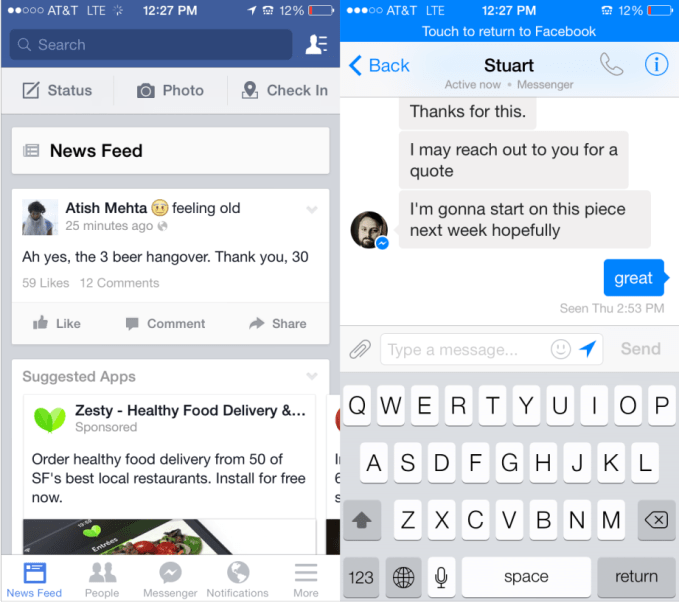
While the rationale for the forced migration might be logical, that doesn’t mean it will sit well with users.
Some people might simply not want to worry about managing two different Facebook apps. Others might have enjoyed the Chat Heads interface that allowed message multi-tasking, so they could chat over the top of what they were doing.
But Facebook counters that people send more photos, group messages, videos, stickers, and audio clips while using Messenger. That’s supposedly means they’re having a better experience. With 200 million users on Messenger sending 12 billion messages a day, Facebook wants to unify its efforts around the app and skip out on maintaining code for a parallel version inside its main apps.
You can watch Messenger’s designers explain why they built the fast-switching shortcut in this hands-on demo and interview:
Messenger really is a much cleaner, faster, more fun way to send Messages. And it’s been getting better over the last few months. It recently added recorded video sharing, and a slick split-screen selfie button for quickly capturing Snapchat-style photos and videos. At version 8, it’s a mature and stable standalone app, unlike the nascent Swarm app that Foursquare is forcing users to download if they want to check in.
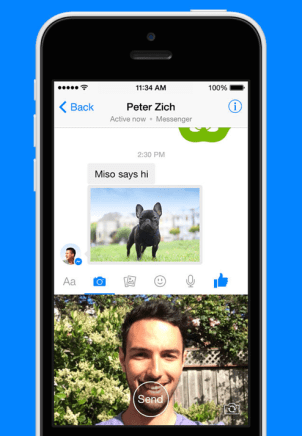 However, the heavy-handed move could still repulse people who are already weary of Facebook. With plenty of other messaging apps as well as SMS available, they have plenty of places to taking their mobile chatting.
However, the heavy-handed move could still repulse people who are already weary of Facebook. With plenty of other messaging apps as well as SMS available, they have plenty of places to taking their mobile chatting.
According to the data and given enough time for the dust to settle, the move might be a smart way to boost messaging usage and acclimate users to Facebook’s burgeoning standalone app familythat also includes Paper and Slingshot. Eventually it could also make Facebook money, as last week CEO Mark Zuckerberg confirmed that Messenger would eventually be monetized by allowing payments.
But for now, Facebook might be hurting public opinion of itself, and reinforcing the perception that it changes whatever it desires without regards to what users want. Zuckerberg seems content to play the long game.
source: Josh Constine/TechCrunch
Discover more from TechBooky
Subscribe to get the latest posts sent to your email.




